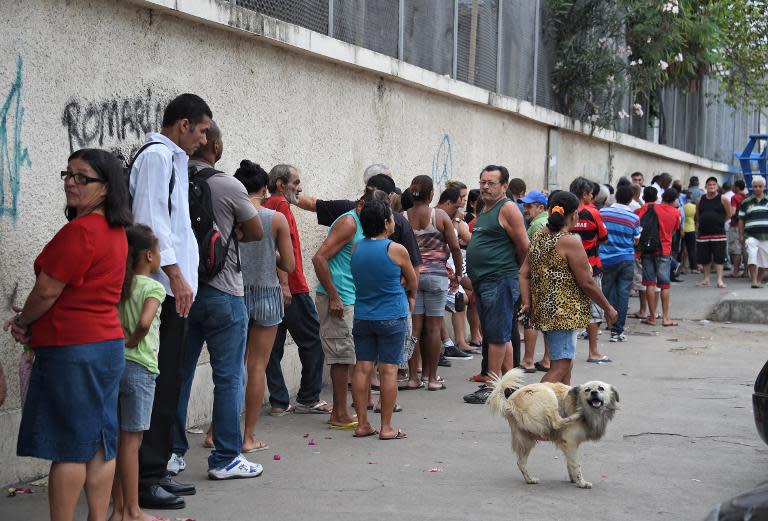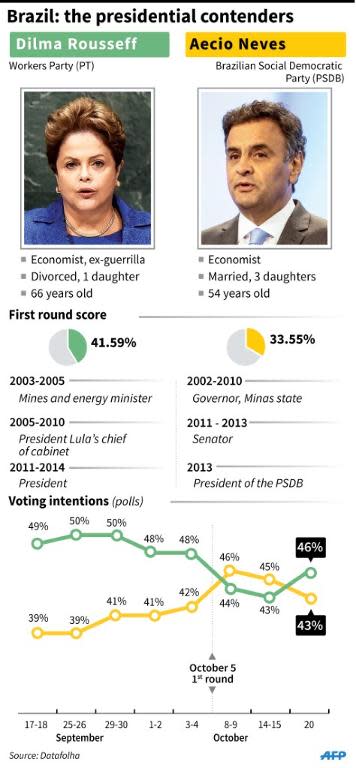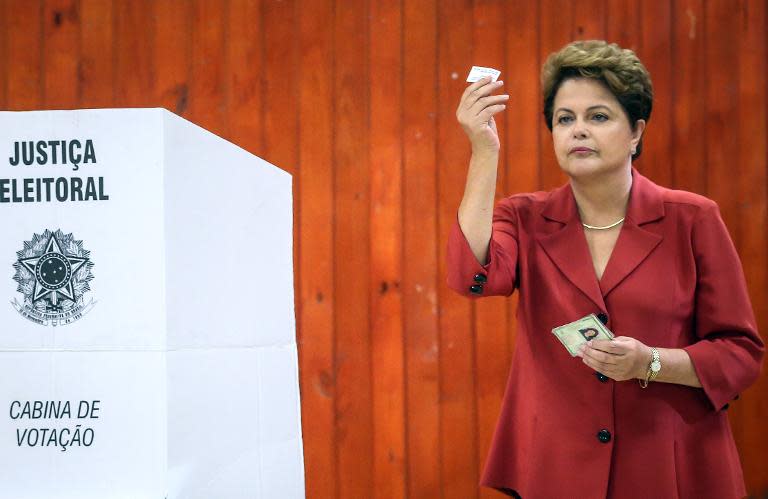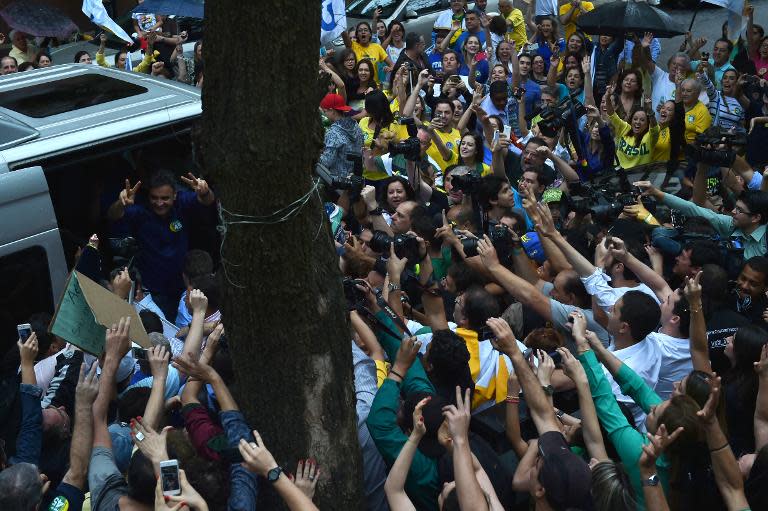Rousseff narrow favorite as divided Brazil votes
After a dramatic, virulent campaign, Brazilians voted for their next president Sunday, weighing leftist incumbent Dilma Rousseff's legacy of social progress against challenger Aecio Neves's promise of economic revival. Rousseff, Brazil's first woman president, was the narrow favorite heading into the vote, with a four- to six-point advantage in the final opinion polls -- though the race to lead the world's seventh-largest economy remained too close to call. The election is widely seen as a referendum on 12 years of government by the Workers' Party (PT) -- eight under working-class hero Luiz Inacio Lula da Silva and four under Rousseff. The party has endeared itself to the masses with landmark social programs that have lifted millions from poverty, increased wages and brought unemployment to a record-low 4.9 percent. But the outlook has darkened since Rousseff won election in 2010, the year economic growth peaked at 7.5 percent. Rousseff, 66, has presided over rising inflation and a recession this year. She also faced massive protests last year against corruption, record spending on the World Cup and poor public education, health care and transport. Neves, the business-world favorite, has vowed to reboot the economy with market-friendly policies while safeguarding the PT's social programs, fending off Rousseff's attempts to cast him as a fat cat who will govern for the upper class. "We are voting for a more equal Brazil with more opportunities," Rousseff said after casting her vote in the southern city of Porto Alegre, sipping on a cup of local mate tea. "People are called to choose between two projects," she said. "Ours is to ensure Brazil continues to grow with more health and education." Neves, accompanied by his ex-model wife, gave V for victory signs as he cast his ballot in Belo Horizonte, where he served two terms as governor of Minas Gerais state. "Change has already begun," the 54-year-old senator tweeted optimistically. - Corruption issue - Rouseff has been hit hard by corruption scandals, especially a multi-billion-dollar embezzlement scheme implicating dozens of politicians -- mainly her allies -- at state-owned oil giant Petrobras. As the campaign wrapped up, conservative news magazine Veja dragged the scandal back to the fore, quoting a suspect in the case as saying Rousseff and Lula personally knew of the scam -- a claim the president vehemently denied. "I am voting for Neves. We are fed up with corruption scandals," Roberto Carlos da Silva, a 34-year-old doctor in a chic Sao Paulo suburb, told AFP. "I'm voting for the PT because I believe in its project of social change. People hate the PT because things have changed. Today domestic workers travel by plane, have a car, study," said civil servant Maria de Fatima de Oliveira Borges in Brasilia. Winning back front-runner status has been a fierce battle for Rousseff, a former guerrilla who was once jailed and tortured for fighting the country's 1964-1985 military regime. First she had to fend off environmentalist Marina Silva, who surged in the opinion polls with her vow to become Brazil's first "poor, black" president when she dramatically entered the race after running mate Eduardo Campos died in a plane crash. Silva ultimately exited the first round three weeks ago, with 21 percent of the vote to 42 percent for Rousseff and 34 percent for Neves. She endorsed Neves, whose comeback briefly lifted him into first place and prompted Rousseff to go on the attack. In an acrimonious campaign, Rousseff accused Neves of nepotism as Minas Gerais governor and played up a report that he once hit his then-girlfriend in public. Neves, the grandson of the man elected Brazil's first post-dictatorship president, responded in kind, accusing Rousseff of lying, incompetent economic management and "collusion" in the Petrobras kickbacks. - Social divisions - The sprawling South American country's 142.8 million voters are deeply divided along social lines. The key battleground is in the industrialized southeast, the cradle of the million-strong protests last year. There, a growing middle class remains grateful for its gains under the PT but is making ever-louder demands. Voters are also electing governors in run-offs in 14 states. Results are expected shortly after polls close at 2200 GMT, thanks to a sophisticated electronic voting system. Brazil has deployed soldiers to beef up security in 224 cities across the country. A polling station in the northeastern city of Mossoro was shocked when a man standing in line to vote was shot to death in what police described as an apparent settling of scores. Nationwide 147 people were arrested for election-related "irregularities" -- mostly illegal campaigning, election officials said.






